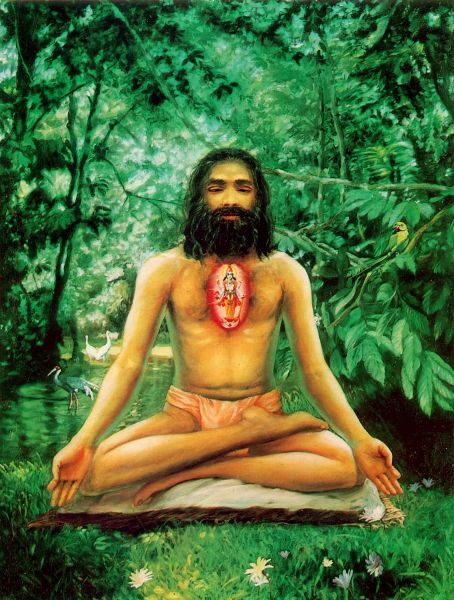|
TEXTS 13-14
samam kaya-siro-grivam
dharayann acalam sthirah
sampreksya nasikagram svam
disas canavalokayan
prasantatma vigata-bhir
brahmacari-vrate sthitah
manah samyamya mac-citto
yukta asita mat-parah
SYNONYMS
samamstraight; kaya-sirahbody and head; grivamneck; dharayanholding; acalamunmoved; sthirahstill; sampreksyalooking; nasikanose; agramtip; svamown; disahall sides; caalso; anavalokayannot seeing; prasantaunagitated; atmamind; vigata-bhihdevoid of fear; brahmacari-vratein the vow of celibacy; sthitahsituated; manahmind; samyamyacompletely subdued; matunto Me (Krsna); cittahconcentrated; yuktahactual yogi; asitabeing so; matunto Me; parahultimate goal.
TRANSLATION
One should hold one's body, neck and head erect in a straight line and stare steadily at the tip of the nose. Thus with an unagitated, subdued mind, devoid of fear, completely free from sex life, one should meditate upon Me within the heart and make Me the ultimate goal of life.
PURPORT
The goal of life is to know Krsna, who is situated within the heart of every living being as Paramatma, the four-handed Visnu form. The yoga process is practiced in order to discover and see this localized form of Visnu, and not for any other purpose. The localized Visnu-murti is the plenary representation of Krsna dwelling within one's heart. One who has no program to realize this Visnu-murti is uselessly engaged in mock-yoga practice and is certainly wasting his time. Krsna is the ultimate goal of life, and the Visnu-murti situated in one's heart is the object of yoga practice. To realize this Visnu-murti within the heart, one has to observe complete abstinence from sex life; therefore one has to leave home and live alone in a secluded place, remaining seated as mentioned above. One cannot enjoy sex life daily at home or elsewhere and attend a so-called yoga class and thus become a yogi. One has to practice controlling the mind and avoiding all kinds of sense gratification, of which sex life is the chief. In the rules of celibacy written by the great sage Yajnavalkya it is said:
"The vow of brahmacarya is meant to help one completely abstain from sex indulgence in work, words and mind—at all times, under all circumstances, and in all places." No one can perform correct yoga practice through sex indulgence. Brahmacarya is taught, therefore, from childhood when one has no knowledge of sex life. Children at the age of five are sent to the guru-kula, or the place of the spiritual master, and the master trains the young boys in the strict discipline of becoming brahmacaris. Without such practice, no one can make advancement in any yoga, whether it be dhyana, jnana or bhakti. One who, however, follows the rules and regulations of married life, having sexual relationship only with his wife (and that also under regulation), is also called brahmacari. Such a restrained householder brahmacari may be accepted in the bhakti school, but the jnana and dhyana schools do not admit even householder brahmacaris. They require complete abstinence without compromise. In the bhakti school, a householder brahmacari is allowed controlled sex life because the cult of bhakti-yoga is so powerful that one automatically loses sexual attraction, being engaged in the superior service of the Lord. In the Bhagavad-gita it is said:
Whereas others are forced to restrain themselves from sense gratification, a devotee of the Lord automatically refrains because of superior taste. Other than the devotee, no one has any information of that superior taste.
Vigatabhih. One cannot be fearless unless one is fully in Krsna consciousness. A conditioned soul is fearful due to his perverted memory, his forgetfulness of his eternal relationship with Krsna. The Bhagavatam says, bhayam dvitiyabhinivesatah syad isad apetasya viparyayo 'smrtih: Krsna consciousness is the only basis for fearlessness. Therefore, perfect practice is possible for a person who is Krsna conscious. And since the ultimate goal of yoga practice is to see the Lord within, a Krsna conscious person is already the best of all yogis. The principles of the yoga system mentioned herein are different from those of the popular so-called yoga societies.
Link to this page: https://prabhupadabooks.com/bg/6/13-14 Previous: Bg 6.11, Bg 6.12, Bg 6.11-12 Next: Bg 6.15
|

